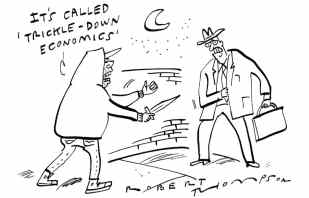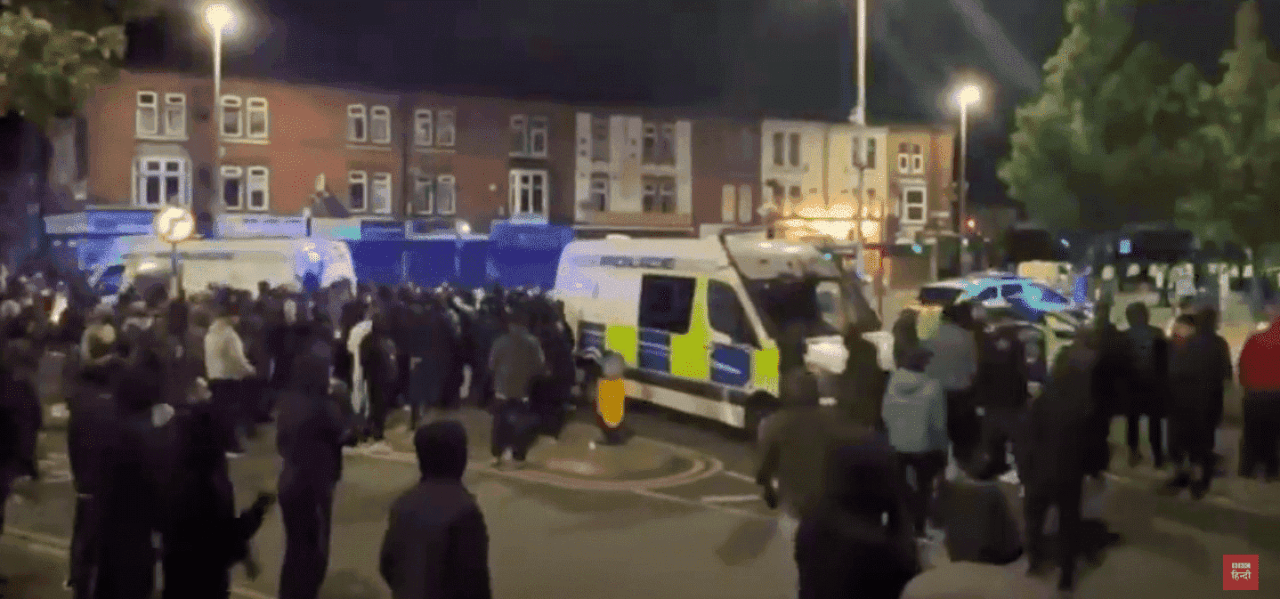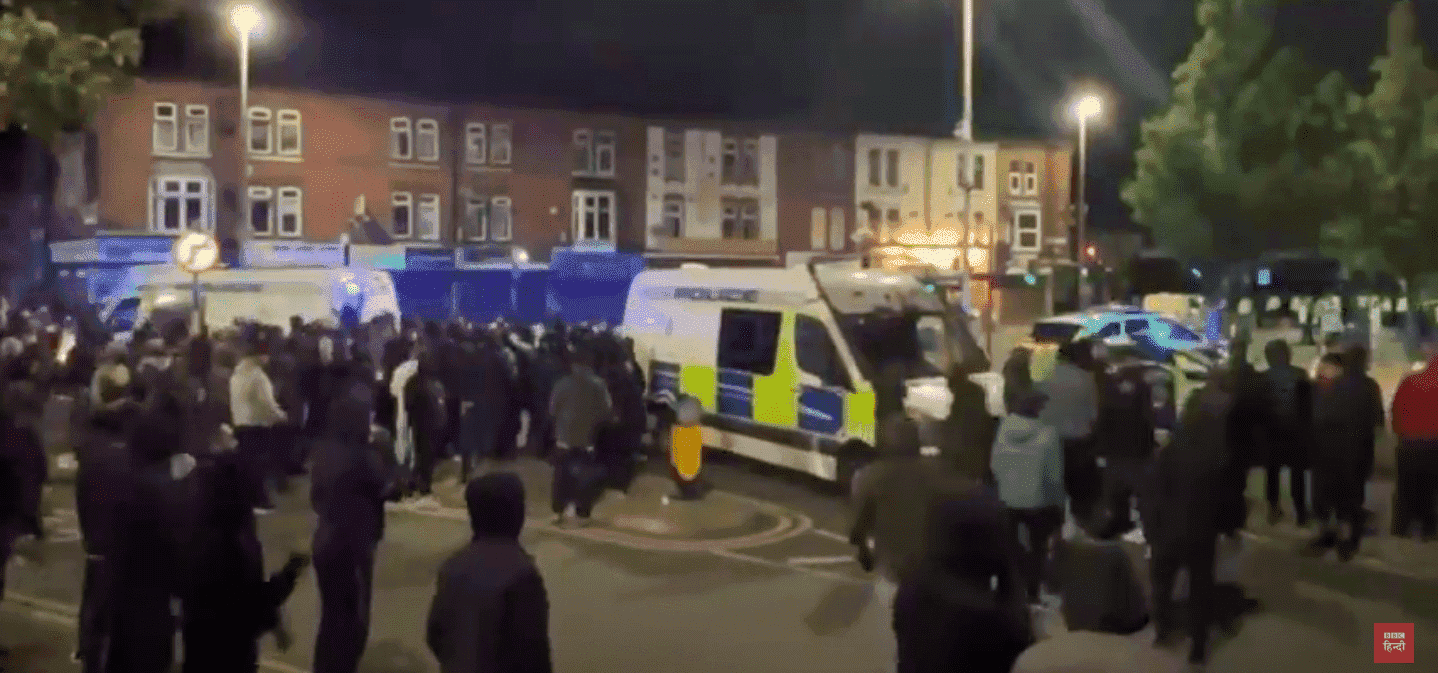As I have said many times in recent years, if you import the world’s people you import the world’s problems. Which is not to say that you do not also get some upsides. The upsides of ‘diversity’ are focused on all the time. But we have a curious habit of downplaying the downsides. Just one of which erupted in the city of Leicester last week.
The origins of the disturbances are disputed, but what is agreed on is that they initially broke out between local Muslims and Hindus in the last days of August. During the India-Pakistan cricket match on the 28th, local fans of the Indian side began shouting ‘Pakistan Murdabad’ (‘Death to Pakistan’). A Sikh man was attacked and before long both sides were chanting slogans against the other on the streets of the city. This escalated into attacks on property and Muslim gangs tearing down religious flags in Hindu areas. Before long it was being claimed on social media that a mosque had been attacked, which turned out to be untrue but which got the Muslim gangs even more mobilised.
Hindu and Muslim groups across social media started to call for their men to come out on the streets – which they did. The Hindus chanted ‘Jai Shree Ram’ (‘Praise Lord Ram’) and some were filmed carrying weapons. Muslims retaliated in kind and in one video were seen setting light to a Hindu flag. This inflamed tensions further and became a political scandal in the Indian media.
Soon charming people like Mohammed Hijab, who rotates between presenting himself as a reasoned interlocutor and a street agitator, arrived on the scene. Hijab made a slight name for himself last year by whipping up a mob on the streets of London. At one anti-Israel protest addressed by Hijab in inflammatory terms, a masked man was filmed chanting ‘We’ll find some Jews. We want their blood’, though Hijab says he had left the protest by that time and later tried to calm things down. Of course the police did nothing much about the crowd itself, for the belief of the British police these days is that as long as a mob can be dispersed at some point, it counts as a great victory for the force.

This week Hijab cropped up in Leicester to whip up his followers. Among other things he told them that Hindus are ridiculous people, not least because of their belief in reincarnation. Hijab claimed that the Hindus must live in fear because they have been reincarnated as such ‘pathetic, weak cowardly people’. ‘I’d rather be an animal,’ he went on.
Soon both sides were accusing the other of attacking their places of worship. Crowds of hundreds faced off in the streets with a thin line of police officers between them. Some in the mobs came armed with knives and other weapons. The British police force – notably filled with women, because diversity targets must be met – stood between the mobs armed with small sticks. I didn’t see any trans officers, or gay ones dancing the macarena, but I trust that there were some there in order to make the whole thing truly diverse.
By Monday the High Commission of India in London announced that it had taken the matter up with the UK authorities and was calling on them ‘to provide protection to the affected people’. The affected people being the Indian community in Leicester whose Hindu religion was being attacked.
Ancient enmities do not die out because they are transplanted to the East Midlands
It is quite something for the Indian government to be calling for a cessation of intra-religious violence on the streets of Britain. That is the sort of thing the North Koreans and Chinese Communist party sometimes do for the lols. But not something that would have been expected from an allied state.
Still, there are a number of responses that you might have to the disturbances in Leicester. One is to do what most of the mainstream media have done and effectively draw a veil over it. These are excitable chappies in one of our nation’s less important cities. It isn’t like this happened in Islington, after all.
Another is to do the knowing-cynic thing, the infinitely clever fifth-form response that we always hear in the pages of certain left-wing journals and from novelists. Don’t you know that we used to rule India? Didn’t you know that Pakistan’s independence was not handled perfectly? Well then, what do you expect? And besides, the diversity that Britain is experiencing is merely an appropriate payback for the sins of empire. This ‘empire strikes back’ theory is not only conceited but contradictory. For it sees migrants from the Indian subcontinent as both a blessing for Britain and a just punishment.
But sadly the most common response is simply to shrug and hope for the best. We have had situations like this before, most notably in Oldham in 2001. Meanwhile, the government commissioned many reports, most notably the Cantle report and the Casey Review. All were welcomed by the governments of the day and then put in a drawer.
Because after all, what are you going to do? Northern Ireland is still riven by ethnic tensions going back to the settlement of Protestants in the early 17th century. Things may have calmed down a bit today. But Ulster politics is still dominated by the central question of whether or not it is right to torture and murder people and plant car-bombs in public places in order to make your point of view heard. The province’s jury is still very much out on the matter.
So why would anyone expect it to be different with the planting of Muslim, Hindu and other minorities in Britain? Ancient enmities do not die out because they are transplanted to the East Midlands. Nor can they be solved by the introduction of the occasional youth centre where people may play a bit of ping-pong.
There are all sorts of advantages to a multi-cultural society. But the downside is that we are only one internet rumour, flag-attack or ethnic chant away from civil unrest. Not my own preferred state for the country, but then I didn’t make the rules, and it’s hardly surprising that at such moments the people who did choose to keep their heads down.








Comments